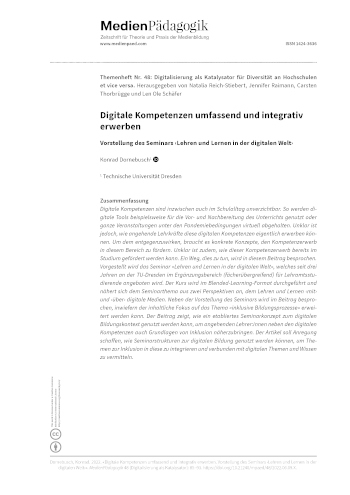Abstract
Digital skills are now also indispensable in everyday school life. The utilization of digital tools for preparing and following up lessons or entire events have to be performed virtually under the pandemic conditions can be seen as an example of digital change in education. However, it is unclear how prospective teachers can actually acquire these digital competencies. To counteract this, concrete concepts are essential to promote the acquisition of competencies in this area. It is also unclear how this acquisition of competencies can be sufficient developed during the course of study. This paper shows one way to do so. This article presents the seminar «Teaching and learning in the digital world» at the TU-Dresden in the supplementary area (interdisciplinary) for student teachers. The seminar approaches the topic from two perspectives, teaching and learning «with» and «about» digital media. In addition to presenting the seminar, the article discusses the extension of the topic of «inclusive educational processes». The article shows how an established seminar concept on the digital educational context aims to introduce prospective teachers to the basics of inclusion in addition to digital competencies. The article hopes to inspire people on the integration and connection between digital and inclusion topics in teaching formats.
References
Brinkmann, Bianca. 2021. «Lehrkräfte vom ersten Semester an für die digitale Welt qualifizieren Policy Brief». Gütersloh. https://www.che.de/download/mlb_policy_brief_2021/.
Eickelmann, Birgit. 2010. Digitale Medien in Schule und Unterricht erfolgreich implementieren: eine empirische Analyse aus Sicht der Schulentwicklungsforschung. Empirische Erziehungswissenschaft 19. Münster New York München Berlin: Waxmann.
Esser, Alexandra, Heike Kröpke, und Heidemarie Wittau, Hrsg. 2016. Tutorienarbeit im Diskurs III – Qualifizierung für die Zukunft. Schriften zur allgemeinen Hochschuldidaktik, Band 2. Münster: WTM Verlag für wissenschaftliche Texte und Medien.
European Commission. Joint Research Centre. 2017. European Framework for the Digital Competence of Educators: DigCompEdu. LU: Publications Office. https://data.europa.eu/doi/10.2760/159770.
Fürstenau, Sara, und Mechthild Gomolla. 2009. Migration und schulischer Wandel: Unterrichtsqualität. Wiesbaden: VS Verlag für Sozialwissenschaften. https://doi.org/10.1007/978-3-531-91724-5.
Gesellschaft für Informatik e.V.. 2016. «Dagstuhl-Erklärung: Bildung in der digitalen vernetzten Welt». Berlin. https://dagstuhl.gi.de/dagstuhl-erklaerung.
Hamilton, Erica R., Joshua M. Rosenberg, und Mete Akcaoglu. 2016. «The Substitution Augmentation Modification Redefinition (SAMR) Model: A Critical Review and Suggestions for Its Use». TechTrends 60 (5): 433–41. https://doi.org/10.1007/s11528-016-0091-y.
Jonassen, David H., Hrsg. 1996. Handbook of Research for Educational Communications and Technology. New York: Simon and Schuster Macmillan.
Kirkpatrick, James D., und Wendy Kayser Kirkpatrick. 2016. Kirkpatrick’s four levels of training evaluation. Alexandria, VA: ATD Press.
Kultusministerkonferenz, Hrsg. 2016. «Bildung in der digitalen Welt. Strategie der Kultusministerkonferenz». https://www.kmk.org/dokumentation-statistik/broschueren.html.
Merriënboer, Jeroen J. G. van, und Paul Arthur Kirschner. 2007. Ten steps to complex learning: a systematic approach to four-component instructional design. Mahwah, N.J: Lawrence Erlbaum Associates.
Röll, Franz Josef. 2003. Pädagogik der Navigation: selbstgesteuertes Lernen durch Neue Medien. München: kopaed.
Watkins, Amanda, Hrsg. 2012. Inklusionsorientierte Lehrerbildung: ein Profil für inklusive Lehrerinnen und Lehrer. Odense Brüssel: European Agency for Development in Special Needs Education.

